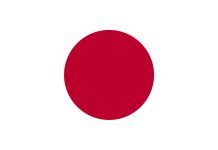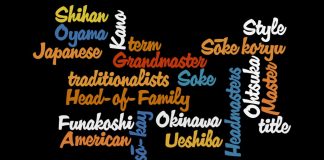| Ma ai: | The distance between two opponents. | |
| Mae: | “Front” or “forward.” | |
| Mae-geri: | Front kick | |
| Mairi: | Tapping with the hand to signify submission. | |
| Makeru: | To lose or be defeated. | |
| Makiwara: | A karate training post designed for toughening various striking points. | |
| Marki: | Block. | |
| Master: | A title bestowed on a martial artist who has attained advanced rank after long years of study. | |
| Mate: | “Wait” or “stop.” | |
| Masutemi-waza | Rear sacrifice techniques | |
| Meijin: | “Expert.” One who has mastered an art far beyond the boundaries of physical prowess. | |
| Mekugi: | A bamboo pin used to secure the handle of a samurai sword to the blade. | |
| Men: | The head protector used in kendo. | |
| Menkyo kaiden: | A certificate of full proficiency in a Japanese martial art, usually awarded to an advanced student deemed more suited to carry on the translation of the art. | |
| Menuki: | Hilt ornaments of a samurai sword. | |
| Meridians: | The paths by which Ki runs through the body. Pressure points are the points on these paths where one can speed up or slow down Ki. | |
| Method of Strategy: | The phrase used by the famous warrior Miyamoto Musashi to refer to the state of mind necessary to fight. | |
| Mi: | The blade of a knife or sword. | |
| Migi: | “Right” or “right side.” | |
| Misogi: | Ritual Purification. The custom of washing away impurities with cold water dates back to the dawn of Japanese consciousness. There is external Misogi – rinsing off the body with cold water, and internal Misogi – cleansing the inner organs with deep, regenerating breaths. | |
| Mi tsung i: | “Labyrinth art.” A highly deceptive method of kung fu featuring rapid, baffling turns and attacks. | |
| Mizugumo: | “Water spider.” A water-crossing device used by the ninja and composed of four carved pieces of wood fastened together to form a circle with a hole in the middle. | |
| Mizukaki: | A weblike device used by the ninja. They were placed on the feet during swimming. Similar to present-day flippers. | |
| Mizu no kokoro: | “Mind like water.” A psychological principle of the martial arts emphasizing the need to calm the mind, much like the surface of undisturbed water, while facing an opponent. A mental state in which one is in harmony, making one able to anticipate an attack. | |
| Modotte: | A command for returning to the original position, used in competition. | |
| Mokpyo: | “Striking point” or “target.” Weak areas of the body that can be effectively struck or kicked. | |
| Mokusoh: | “Quiet thought. reflection, contemplation” A quiet form of reflection on your training which helps prepare the mind, body and spirit to train. Mokusoh is usually performed before and after a training session in the Japanese martial arts. | |
| Montsuki: | A Kimono like blouse worn by Iaido practitioners. It is black in winter and white in summer. Black is used for all formal events. | |
| Moo duk kwan: | “Institute of military virtue.” A style of Korean martial arts similar to Tae Kwon Do. | |
| Mooreup: | Knee. | |
| Morote-gari: | Two hands sweep | |
| Motonoichi: | “Return to the original position.” A command used by a referee during a karate match. | |
| Mu: | “Nothing.” The Zen nothingness or emptyness. This principle is often used in the Japanese martial arts to make one clear in the mind of all thought so the body will respond instantly to any situation. | |
| Mudansha: | A martial arts student who has not yet attained the rank of black belt. | |
| Muga: | The ability to focus so completely on the act at hand that nothing can interfere with its completion. | |
| Muga Mushin: | “no self, no mind” The concept that if the martial artist puts aside all selfish thoughts, ego and conceit, one can defeat the opponent. Without the conscious will of the practitioner, the power of the art is allowed to work. | |
| Mushin: | “no mind”. An open mind that is not concerned with appearances. | |
| Mui fa jeong: | “Plum flower stumps.” A series of tree stumps driven into the ground on top of which certain styles practice kung fu. | |
| Mune: | Chest or abdomen. | |
| Mune-Ate: | Bamboo Armor. | |
| Muton: | The short sticks used in arnis, usually about three feet in length. | |
| Myung chi: | Solar plexus. |







